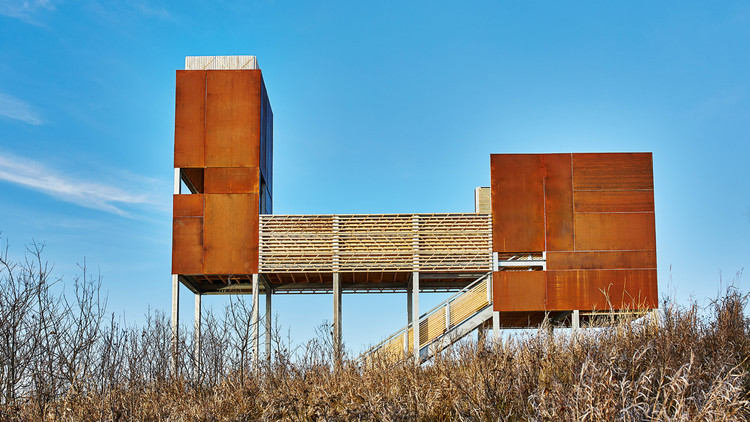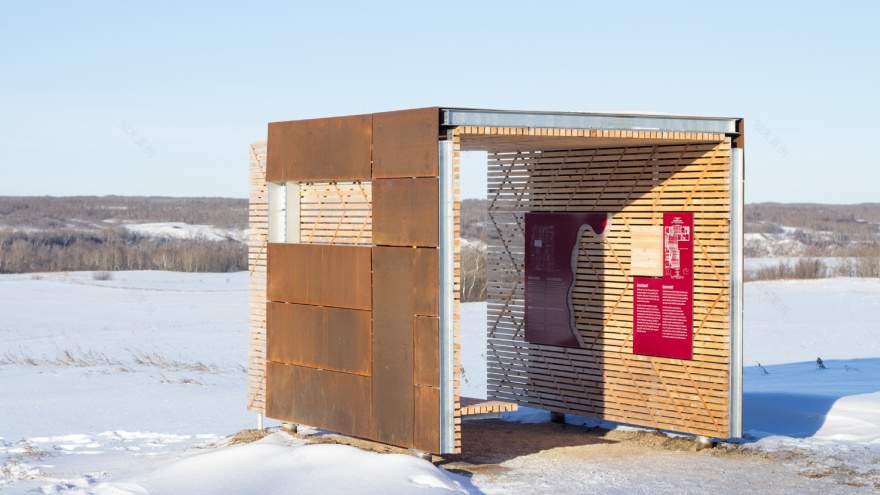查看完整案例


收藏

下载
Cutline. A cut-line framed by the viewing lens stresses the connection with the river and river-lots, and emphasizes the notion of land as a primary character. Image © Peter Lawrence
割线。一条由观看镜头构成的切割线强调了与河流和河流的联系,并强调了土地作为一个主要角色的概念。图像(彼得·劳伦斯)
随着百年伊始庆祝活动的展开,重要的是不要忽视加拿大前联邦和第一民族的遗产。这项经验设计工作旨在加强加拿大政府与萨斯喀彻温省梅蒂斯民族之间的联系。(鼓掌)
As sesquicentennial celebrations unfold, it is important not to overlook Canada’s pre-Confederation and first nations heritage. This experiential design undertaking is aimed at strengthening ties between the Canadian Government and the Métis Nation—Saskatchewan.
Parti Diagram.Our parti focuses on two approaches to land division: one accounts for access to the river; the other devised with lack of regard for inhabitants. Image © Provincial Archives of Saskatchewan S-B6500 [left]; Form:Media [right]
乌尔巴蒂着重于两种划分土地的方法:一种是通往河流的通道;另一种是在不考虑居民的情况下设计的。图C萨斯喀彻温省档案馆S-B 6500[左];形式:媒体[右]
这一历史的核心是土地争端-这是我们核心概念的灵感源泉。两种截然相反的土地占有方式:一种考虑周到的线性和河流导向的土地分配方式,一种是半游牧的农耕民族,另一种是以非自然网格为基础的制度,由另一个国家强加给另一个国家。这里有一个从非问题到冲突的土地的见证,通过第一民族和政府之间的正式合作达成协议。
At the heart of this history is a land dispute—the source of inspiration for our core concept. Two opposing methods of landholding: a thoughtful linear and river-oriented allotment by a semi-nomadic turned agrarian people versus an unnatural grid-based system imposed on one nation by another. Herein lies a testimony of a land that follows from non-issue to conflict, through an entente to a formal collaboration between a First Nation and a government.
Viewing platform. The platform represents a singular cultural heritage of dual origins. The Métis are descendants of those born of indigenous and European (typically French) peoples.Image © Peter Lawrence
查看平台。该平台代表了双重起源的独特文化遗产。姆霍蒂斯是由土著和欧洲(通常是法语)人出生的人的后代。形象()彼得·劳伦斯
自1923年以来,这是加拿大的一个国家历史遗迹,这955公顷的财产是一个令人印象深刻的景观在环境中的白杨林和残余羊草草原。我们项目的重点是第47号,曾经繁荣的巴托什村的所在地。我们的设计旨在讲述这个被认为是梅蒂斯民族心脏的地方的故事。梅蒂斯人是土著和欧洲人民的后裔。
A National Historic Site of Canada since 1923, this 955 hectare property is an impressive landscape in a setting of aspen forest and remnant fescue prairie. The focus for our project is Lot 47, the location of the once thriving village of Batoche. Our design seeks to tell the story of this place, considered the heart of the Métis nation. The Métis are descendants of those born of indigenous and European peoples.
Site plan. The narrative is organized as a linear experience: context (viewing lens); conflict (cutline); climax (observation platform), and the current day (family garden). Rendering: Ekistics Planning & Design; Image © Peter Lawrence
现场计划。叙事被组织成一种线性体验:语境(观察镜头);冲突(切线);高潮(观察平台);以及当前(家庭花园)。渲染:生态规划
我们没有强加无数和频繁的插画,而是通过微妙的四个显眼元素的放置,将这广阔的文化景观结合起来。最小的干预和较少的足迹是关键目标。例如,一个简单的修剪/烧成的条带,加强了河流的线性和方向。在桩上架设建筑物,以减少对这个考古敏感地点的影响。坚固的材料-耐候和镀锌钢,雪松和石头-尽量减少维护和唤起主题的永久性。效率贯穿细节
Rather than imposing numerous and frequent insertions, we unite this expansive cultural landscape through the delicate placement of four conspicuous elements. Minimal intervention and a light footprint were key goals. For example, a simple mowed/burned strip that reinforces the linearity and direction of the river lot. Structures are raised up on piles to reduce impact on this archaeologically sensitive site. Robust materials—weathering and galvanized steel, cedar, and stone—minimize maintenance and evoke themes of permanence. Efficiency pervades the details–best demonstrated by innovative batten joinery developed to significantly reduce the size and quantity of fasteners.
Viewing lens. The viewing lens introduces visitors to the central message—a land dispute—through a design that incorporates form, material, didactic content, and the landscape. Image © Peter Lawrence
观察镜头。观景镜通过一种结合了形式、材料、教学内容和景观的设计,向游客介绍了中心信息-土地纠纷。图像(彼得·劳伦斯)
Viewing lens elevations. Image © Peter Lawrence; Rendering: Ekistics Planning & Design
观看镜头高度。图像(彼得·劳伦斯);渲染:生态规划
Wooden panel system. Slats are connected by timber battens on 45°angles—front and reverse. The battens act as structural elements limiting the size and quantity of mechanical fasteners. Image © Peter Lawrence
木板系统板条由45°角度的木条连接-正面和背面。拉杆作为结构元件,限制了机械紧固件的尺寸和数量。图像(彼得·劳伦斯)
从萨斯卡通浆果行的间距到整个场地的组织,不同的河流地段土地划分一直起着重要作用。木版系统是一种提供支撑的结构,是代表河流地段的一种造型,它也植根于另一种对梅蒂斯文化的借鉴:丝带的编织。这种解释通过尊重战前和战后的故事来支持一种自豪感。与现代建筑形式和材料一起,梅蒂斯文化欣欣向荣的信念得到了加强。
The distinct seigneurial river lot land division plays a role throughout, from the spacing of Saskatoon berry rows in to the organization of the overall site. The wooden panel system—a structure to provide support, a trope to represent the river lots—is also rooted in another reference to Métis culture: the weave of the ceinture fléchée sash. The interpretation supports a sense of pride by honouring both the pre- and post-battle story. Together with modern building forms and materials, the conviction of a thriving Métis culture is reinforced.
Stage. The view planes are purposeful: ahead (stage West) is obscured by the second steel chamber; to the north are the remains of Batoche’s East Village. Image © Peter Lawrence [left]; Image © John deWolf [right]
舞台。观景飞机是有目的:前方(西段)被第二个钢室遮住了;北边是巴托什东村的遗骸。图像:彼得·劳伦斯[左];形象·约翰·德沃尔夫[右]
View planes. Far from overt, the three ‘stages’ of the platform respect the Metis’ relationship with the land by providing views to the land (North and East), water (South and West), and sky. Rendering: Ekistics Planning & Design
查看飞机。平台的三个“阶段”远没有公开,而是通过向陆地(北和东)、水(南和西)和天空提供视图来尊重梅蒂斯与土地的关系。渲染:生态规划
作为一个多重职业的团队,我们的同事的方法、流程和工作流程的合成丰富了我们的设计人员。例如,我们的建筑师和景观设计师不仅要考虑自然/建造的环境,还要考虑解释和图形细节作为其跨学科设计过程的一部分。这是个相互协作的科目,使用景观不仅仅是一个设置,而是作为一个主角。
As a team of multiple professions, the synthesis of method, process, and workflow of our colleagues enriches our designers. For example, our architects and landscape architects think not only of the natural/built environment, but consider interpretation and graphic details as part of their interdisciplinary design process. This is an account of disciplines collaborating to use the landscape not merely as a setting, but rather as a lead character.
Timeline. The chamber celebrates a thriving culture. A 5.3m timeline starts at the floor, and projects skyward to suggest “forevermore” and an infinite future. Image © Peter Lawrence [left]; Image © John deWolf [inset and right]
时间线。商会庆祝一种欣欣向荣的文化。530万的时间线从地面开始,向天空投射,以暗示“永远”和一个无限的未来。图像:彼得劳伦斯[左];图像c约翰德沃尔夫[内嵌和右]
Foundations. All that remains of the village are foundations and cellars. The rail allows the visitor to engage in imagining these buildings in the landscape. Image © John deWolf
基金会。村子里剩下的都是地基和地窖。铁路允许游客在景观中想象这些建筑物。图片(约翰·德沃尔夫)
加拿大公园的目标是设计一个有趣的、独一无二的、互动的设计,其中包含了巴托什具有历史意义的主题和活动。帕克斯希望利用这个项目作为一座桥梁,让一处因抵抗而留下疤痕的景观讲述一个繁荣文化的故事,创造一个目的地,并重建联系。通过设计,我们希望尊重梅蒂斯的故事,改善文化关系。
Parks Canada’s goal is for an architecturally interesting, one-of-a-kind, and interactive design that incorporates historically significant themes and activities of Batoche. Parks wished to use this project as a bridge to allow a landscape scarred by resistance to tell a story of a thriving culture, to create a destination, and to reestablish ties. Through design, we hope to honour the Métis story and to improve cultural relations.
Family Garden. The family garden is organized within a swath of Saskatoon Berry hedgerows, set in 2m increments forming a scale representation of the Métis river lots. Rendering: Ekistics Planning & Design
家庭花园。家庭花园是在一条带状的萨斯卡通贝里树篱,设置成2米的增量,形成了梅蒂斯河地段的规模代表。渲染:生态规划
Architects Ekistics Planning & Design
Location Batoche, SK S0K, Canada
Category Installations & Structures
Project Lead John deWolf
Lead Architects Chris Crawford (architecture), Devin Segal (landscape architecture)
Area 1695.0 m2
Project Year 2016
Manufacturers Loading...
客服
消息
收藏
下载
最近



























